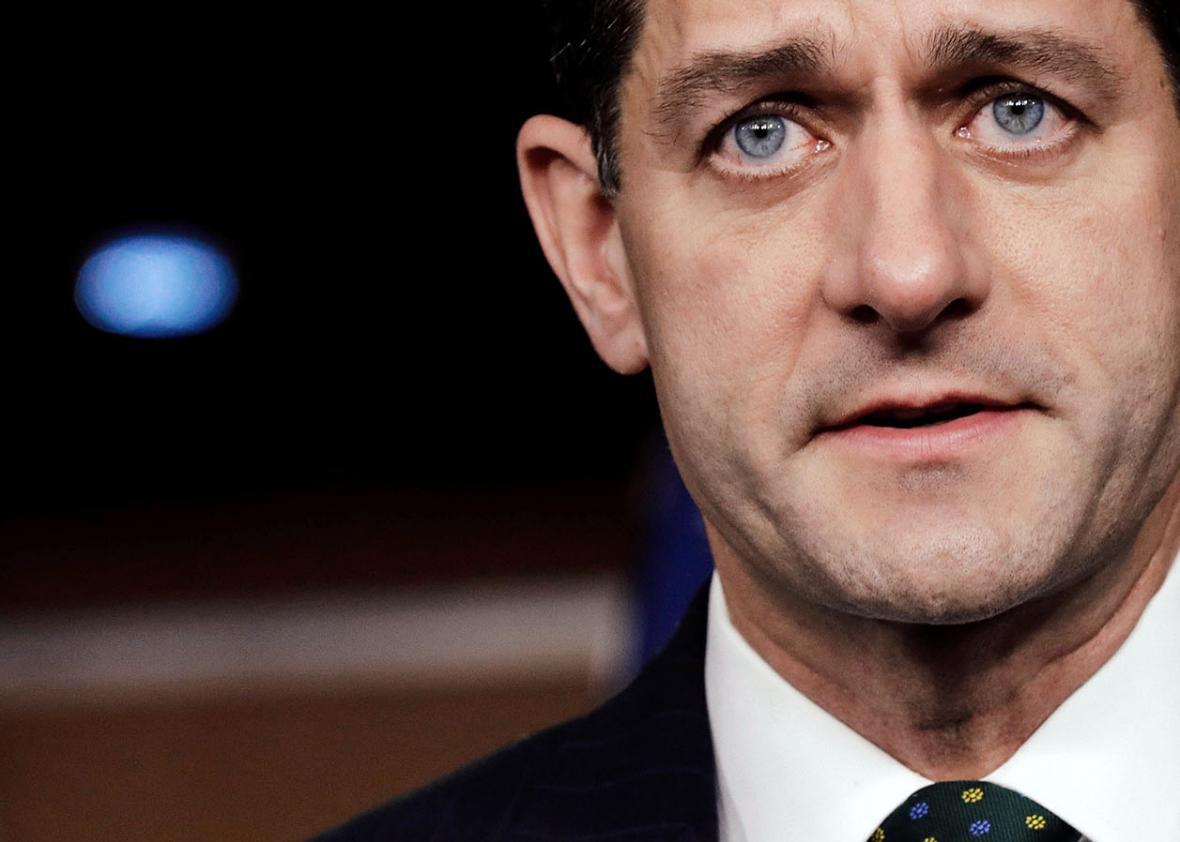House Republicans gave themselves a lengthy ovation on the floor of the chamber Tuesday afternoon when it was clear the Tax Cuts and Jobs Act had met the threshold for passage. They gave themselves another lengthy ovation a couple of minutes later when Speaker Paul Ryan enthusiastically gaveled in the vote at 227–203. They will presumably re-create these ovations again on Wednesday, when they have to revote because certain provisions of the bill violated Senate rules. It’s no surprise they’re ecstatic, considering the large stride toward several partisan end goals: cutting the corporate tax rate nearly in half, eliminating a central pillar of the Affordable Care Act, and opening up the Arctic National Wildlife Refuge to drilling.
The problem, though, is that the legacy-defining bill they’re so enthused with is historically unpopular.
A CNN poll released shortly before the vote showed 33 percent of the country supported the bill, while 55 percent opposed. That 33 percent figure is a hearty 2 percentage point increase from November. But only 45 percent opposed the bill in November.
So, do Republicans have a plan for this heading into the 2018 midterms, which weren’t looking so swell for them even before they introduced the tax bill? Or is this a straight loot-and-flee operation?
There are a few twigs for Republicans to clutch onto as the blue wave threatens to carry them away.
The first is that by passing the closest approximation to a pure donor-maintenance omnibus package, they’ve ensured they’ll have all the monetary resources they need to defend their seats in 2018. The pocketbooks will open in a big way. (Some, more cynical than I, might even call this the impetus behind the bill.)
The second, as Oklahoma Rep. Tom Cole told reporters after the vote on Tuesday, is that some of the most unpopular provisions from the original House bill that garnered the most public attention—eliminating deductions for student loan interest, major medical expenses, and teachers’ supplies; treating tuition waivers as taxable income—didn’t make it into the conference report, which is much closer to the Senate bill. “In my district, I have the University of Oklahoma and four other colleges,” Cole said, noting that he had gotten a lot of feedback on the provision taxing tuition waivers. “Those aren’t in there” now, he said.
The final bill, unlike either the original House or Senate bills, also retains at least partial deductibility of state and local income taxes. It was notable last week, when the two-page description of the conference report’s major provisions was distributed, how many of the bullet points showcased popular breaks targeted in previous bills that had been kept.
“I’ve found with most members, the key thing is: Can you go home and explain it and defend it?” Cole added. “If you can defend it, if you don’t back off from it, most people say, ‘oh, I understand that. I see why you did that.’ ”
“Most votes, in the end,” he said, “are not determinative of your fate.”
He pointed out that he’d voted for TARP when that was highly toxic, but voters understood him when he laid out his case. Not all politicians were so lucky.
The most straightforward case for how Republicans improve the popularity of the bill ahead of the midterms boils down to one word: February.
“On Feb. 1, look at your paychecks,” House Ways and Means Committee Chairman Kevin Brady said at a post-vote press conference. “You’ll see the tax relief we deliver today.” The majority leader, Kevin McCarthy, also implored the public to “check your check” in February. Speaker Paul Ryan said it most plainly: “In February, [Americans] are going to see withholdings go down so they see bigger paychecks.”
Republicans are banking on an expected shift in public opinion for those voters who see their paychecks increase. A Monmouth University survey released Monday, which showed the bill with only 26 percent approval, also revealed that “half of the public (50%) predict that the federal taxes they pay will go up” while “just 14% say their taxes will go down.”
At least in 2018, this isn’t what will happen. The vast majority of people will get a tax cut next year, and that should be reflected in paycheck withholding. If people start seeing more money, the anger the bill has sparked could defuse. (The 50 percent that predict taxes will increase is, of course, correct in the long term. The bill as written—and Republicans insist this is only a budget gimmick they’ll fix later—would increase taxes on average for those making below $75,000 by 2027.)
If congressional Republicans were sensible, they would spend 2018 running on bigger paychecks and devoting any remaining legislative energies to infrastructure. Instead, though, they seem intent on using the deficits created by these tax cuts to justify new entitlement cuts. If they do that, they will drown out whatever goodwill they receive from those bigger paychecks, and Democrats will gladly run on how Republicans financed a large tax cut predominantly benefiting the wealthy by cutting Medicare, Medicaid, and SNAP. No one will care that Republicans, in the eleventh hour, were gracious enough to keep the medical expense deduction if, in their next move, they convert Medicare into a voucher system. There are ways for Republicans to improve public opinion of this tax bill from its current lowly state. At a minimum, though, they need to not trip over themselves in their very next move.
